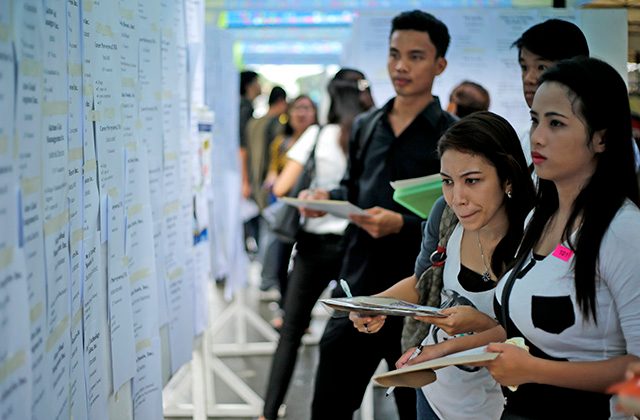SUMMARY
This is AI generated summarization, which may have errors. For context, always refer to the full article.

MANILA, Philippines – The pressing problem of jobs mismatch leads to higher unemployment.
This is what Senator Joel Villanueva said, as he sought a congressional inquiry into the status of job-skills mismatch in the country.
Villanueva, chair of the Senate committee on labor and employment, filed Senate Resolution 129, asking the same panel to investigate the “prevalent” problem of jobs mismatch. (READ: NEDA: Address skills mismatch to increase decent jobs)
Data from the Department of Labor and Employment showed that out of the more than 4.2 million domestic and international job vacancies offered in nationwide fairs in 2014, only 391,088 of 1.3 million applicants were hired on the spot.
Villanueva also cited an April 2016 Labor Force Survey that pegs the unemployment rate in the country at 6.1%, majority of whom are high school graduates and college graduates.
He said the present training and education of the youth do not match the needs of employers. (READ: K to 12: Can it address the labor mismatch?)
“Kalimitan, hindi po tugma ang training at edukasyon ng ating mga kabataan sa hinahanap na kwalipikasyon ng mga employers,” the senator said in a privilege speech on Wednesday, September 14.
(More often than not, training and education of the youth do not match the qualification sought by employers.)
Match education, training with labor needs
As such, he said policies should improve the communication between education and training and the labor market. (READ: PH labor mismatch due to lack of jobs road map – advocates)
For example, the senator said, if a certain region is a known hub for manufacturing plants, universities and/or teaching centers in that region should offer courses that are meant to supply the demand in the locality.
Citing DOLE reports, Villanueva said jobs mismatch is strongly felt in the manufacturing, electronics and semiconductor, and tourism sectors – key employment generators based on the Philippine Development Plan.
“Samakatuwid, Mr President, hindi po trabaho ang kulang, ang kulang ay mga graduates na swak sa trabaho,” he said.
(In short, Mr President, we don’t lack jobs, we lack graduates who match the jobs.)
The 2014 report of the Global Agenda Council on Employment identifies different forms of skills mismatch.
These include skills shortage, where demand for a skill exceeds the supply of people with that skill; qualification mismatch, where the level of qualification is different from that required to perform the job adequately; and skill gap, wherein the type of skills is different from that required to perform the job adequately.
The problem of jobs mismatch, Villanueva said, could be addressed by partnering with industry associations strengthening enterprise-based training, and expanding technical vocational education and training, among others. – Rappler.com
Add a comment
How does this make you feel?
There are no comments yet. Add your comment to start the conversation.